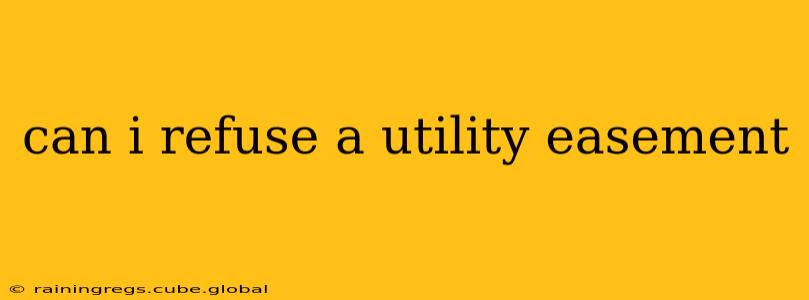Can I Refuse a Utility Easement?
The question of whether you can refuse a utility easement is complex and depends heavily on several factors, including your location, the type of easement, and the specific circumstances. While you might try to refuse, success isn't guaranteed, and attempting to do so without fully understanding the legal ramifications could have serious consequences.
Understanding Utility Easements
A utility easement is a legal right granted to a utility company (like an electric, gas, or water company) to use a portion of your property for the purpose of installing, maintaining, and repairing utility lines or equipment. This right is typically documented in a legal agreement, either as part of your property deed or a separate easement agreement. These easements are crucial for providing essential services to homes and businesses.
Can you refuse outright? Generally, no. The answer often comes down to whether the easement is already in place or is being proposed.
1. Existing Easements: If the easement is already recorded on your property's deed, it's legally binding, and you likely have very little recourse to refuse it. Your property was likely purchased with the knowledge of the existing easement. Attempting to obstruct the utility company's use of the easement could result in legal action against you.
2. Proposed Easements: If a utility company is proposing a new easement, your ability to refuse depends significantly on local laws and regulations. In some cases, the utility company might have the power of eminent domain, allowing them to acquire the easement even if you refuse. Eminent domain is the right of the government (or a government-authorized entity) to take private property for public use, providing just compensation. However, even with eminent domain, the process is legally defined, and you'll have the right to negotiate and potentially challenge the valuation of the easement.
Factors Affecting Your Ability to Refuse:
- Necessity: If the easement is deemed absolutely necessary to provide essential services to your property or the surrounding area, your chances of successfully refusing are slim. Courts generally favor the public interest in accessing essential utilities.
- Location: Local laws and regulations governing utility easements vary significantly. Some jurisdictions provide stronger protections for landowners than others.
- Negotiation: Before outright refusal, attempt negotiation with the utility company. You may be able to negotiate aspects of the easement, such as the location, size, or compensation.
- Legal Counsel: Seeking legal advice from a real estate attorney specializing in property rights is crucial to understanding your rights and options. They can assess your specific situation and advise on the best course of action.
H2: What are my options if I disagree with a proposed easement?
Your options, if you disagree with a proposed easement, include:
- Negotiate: Attempt to negotiate with the utility company to change the proposed location, size, or terms of the easement.
- Consult an attorney: A real estate attorney can advise you on your rights and the best way to proceed.
- Appeal: In some cases, you might be able to appeal the easement to a local or state regulatory body.
H2: What happens if I refuse a utility easement and the utility company proceeds anyway?
If a utility company proceeds with an easement despite your refusal (especially if they have the right of eminent domain), you could face legal consequences. This might include fines, court orders to allow access to your property, or even the loss of your property.
H2: Can I get compensated for a utility easement on my property?
Yes, you're typically entitled to compensation for the use of your property, though the amount may vary. The compensation should reflect the loss of use or any reduction in property value caused by the easement. This compensation is often negotiated, and seeking legal counsel can help you secure fair compensation.
H2: How can I prevent future utility easements?
Preventing future easements is difficult, but you can take steps to minimize the likelihood, such as:
- Thorough review of property documents: Carefully examine property deeds and related documents before purchasing a property.
- Negotiate terms upfront: If you're involved in land development or construction, carefully negotiate the placement and terms of any easements.
- Consult legal counsel: Consulting with a legal professional ensures your interests are protected throughout the entire process.
Ultimately, navigating utility easements requires a thorough understanding of property law and your specific situation. Don't hesitate to seek professional legal advice to protect your rights and interests.
